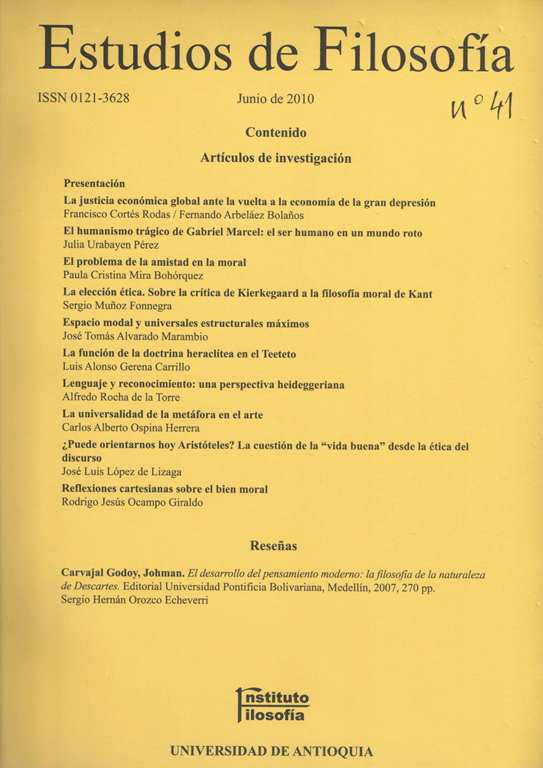The Problem of friendship in ethics
DOI:
https://doi.org/10.17533/udea.ef.11604Keywords:
morals, impartiality, interpersonal relations, Aristotle, virtue, eudaimonial, friendshipAbstract
This paper analyzes the reactivation of the question of the importance of friendship for Ethics. In a first part it analyzes, from diverse perspectives, the criticisms, which become stronger as time goes by, to the impartiality and universalist theories of Ethics, that have raised in turn the rebirth of the treatment of friendship as a moral phenomenon; such analysis pretends to call the attention on diverse critical points of the so-called Theories of Friendship. In a second part is analyzed the Aristotelian model of virtuose friendship, showing the structure of this kind of friendship and its relationship to Ethics, to stress thus some points of the Aristotelian Theory of Friendship that can be helpful for a better understanding of the problem nowadays.
Downloads
References
ARISTÓTELES, (2009) Ética a Nicómaco, Centro de Estudios Políticos y Constitucionales, Madrid.
BARON, M. (1991) “Impartiality and Friendship”, en: Ethics, Vol. 101, No. 4, Jul., pp. 836-857. DOI: https://doi.org/10.1086/293346
BADHWAR, N. K. (1991) “Why It is Wrong to Be Always Guided by the Best: Consequentialism and Friendship”, en: Ethics 101, pp. 483-504. DOI: https://doi.org/10.1086/293313
BENHABIB, S. (2006) El ser y el otro en la ética contemporánea, Gedisa, Barcelona.
BLUM, L.A. (1980) Friendship, Altruism and Morality, Routledge & Kegan Paul, London/Boston/ Melbourne.
COOPER, J. (1977) “Aristotle on the Forms of Friendship” en: Review of Metaphysics 30, pp. 619-648.
FRIEDMAN, M. (1994) “Feminismus und moderne Formen der Freundschaft: Eine andere Verortung der Gemeinschaft” en: Honneth, A. (ed.), Pathologien des Sozialen. Die Aufgabe der Sozialphilosophie, Fischer, Frankfurt am Main, pp. 184-204.
FRIEDMAN, M. (1993) What are friends for? Feminist Perspectives on Personal Relationships and Moral Theory, Cornell University Press, Ithaca, New York.
GILLIGAN, C. (1982) In a Different Voice: Psychological Theory and Women’s Development, Harvard University Press, Cambridge/London.
LA FOLLETE, H. (1996) Personal Relationships: Love, Identity, and Morality. Blackwell, Oxford/Cambridge.
MIDLEY, M. (2002) Delfines, sexo y utopías. Doce ensayos para sacar la filosofía a la calle. Fondo de Cultura Económica, México.
NODDINGS, N. (1984) Caring: A feminine Approach to Ethics and Moral Education, University of California Press, Berkeley.
NUSSBAUM, M. (1986) The Fragility of Goodness. Luck and Ethics in Greek Tragedy and Philosphy, Cambridge University Press, Cambridge/ New York.
PLATÓN. (1986) República, Gredos, Madrid.
RACHELS, J. (2008) Eltern, Kinder und die Moral, en: Von Person zu Person. Zur Moralität persönlicher Beziehungen, Honneth, A. und Rössler, B. (Ed.), Suhrkamp, Frankfurt am Main.
STOCKER,M.(1976) “The Schizophrenia of Modern Ethical Theories”, Journal of Philosophy, 73, pp. 453-466. DOI: https://doi.org/10.2307/2025782
VETLESEN,A.J.(2008) “Freundschaft in der Ära des Individualismus”, en: Von Person zu Person. Zur Moralität persönlicher Beziehungen, Honneth, A. und Rössler, B. (Ed.), Suhrkamp, Frankfurt am Main.
VOGT, K. (2001) “Freundschaft, Unparteilichkeit und Feindschaft”, en: Deutsche Zeitschrift für Philosophie, 49, pp. 517-532. DOI: https://doi.org/10.1524/dzph.2001.49.4.517
WOLF, U. (1999a) “Tugend und Glück. Was Platon und Aristoteles lehren”, en: Glück und Gerechtigkeit. Moral am Ende des 20. Jahrhunderts, Insel, Frankfurt am Main/Leipzig, pp. 27-40.
WOLF, U. (199b) Die Philosophie und die Frage nach dem guten Leben, Rowohlt, Hamburg, 1999.
Downloads
Published
How to Cite
Issue
Section
Categories
License
Copyright (c) 2010 Paula Cristina Mira Bohórquez

This work is licensed under a Creative Commons Attribution-NonCommercial-ShareAlike 4.0 International License.
Authors who publish with this journal agree to the following terms:
1. The Author retains copyright in the Work, where the term "Work" shall include all digital objects that may result in subsequent electronic publication or distribution.
2. Upon acceptance of the Work, the author shall grant to the Publisher the right of first publication of the Work.
3. The Author shall grant to the Publisher a nonexclusive perpetual right and license to publish, archive, and make accessible the Work in whole or in part in all forms of media now or hereafter known under a Creative Commons Attribution-NoCommercia-ShareAlike (CC BY-NC-SA 4.0), or its equivalent, which, for the avoidance of doubt, allows others to copy, distribute, and transmit the Work under the following conditions: (a) Attribution: Other users must attribute the Work in the manner specified by the author as indicated on the journal Web site;(b) Noncommercial: Other users (including Publisher) may not use this Work for commercial purposes;
4. The Author is able to enter into separate, additional contractual arrangements for the nonexclusive distribution of the journal's published version of the Work (e.g., post it to an institutional repository or publish it in a book), as long as there is provided in the document an acknowledgement of its initial publication in this journal;
5. Authors are permitted, and Estudios de Filosofía promotes, to post online the preprint manuscript of the Work in institutional repositories or on their Websites prior to and during the submission process, as it can lead to productive exchanges, as well as earlier and greater citation of published work (see The Effect of Open Access). Any such posting made before acceptance and publication of the Work is expected be updated upon publication to include a reference to the Estudios de Filosofía's assigned URL to the Article and its final published version in Estudios de Filosofía.















